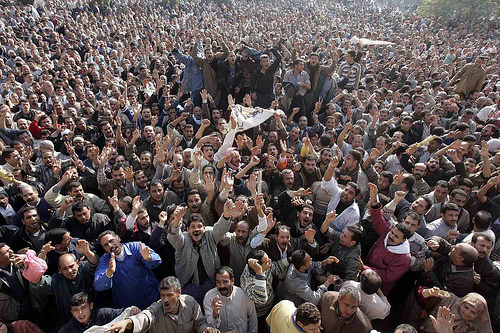February 11, 2011 will go down in history as the day the people of Egypt, overthrew their corrupt government using only their numbers, non-violent protest, cell phones and computer social networks to secure 18 days to freedom. Watching the event unfold on television one would see large numbers of revolutionaries dancing around fires inTahrir Square in Cairo at night, only to be replaced the following morning by a Goggle page with protesters demands or a Face book page dedicated to the revolution.
Egypt's ousted leader, Hosni Mubarak is a murderer and a thief by most accounts, but because he was a "friend of the U.S.," many Republicans were hoping he could somehow survive this revolution. They knew his ideology, they knew his pro-Israeli approach to Middle East politics. His personal shortcomings were beside the point. The Egyptian Army says it will continue friendly relations with Israel.
Egypt's people, however, knew Mubarak as an old-style dictator who killed anyone who got in his way, whose jails were filled with his opposition, who regularly stole money from foreign nations meant to help Egypt's impoverished people. They knew him their whole lives. He had rigged elections to keep himself in office for 30 years and was setting up preparations to have his son succeed him. For Egyptians, this was the last straw. Egypt didn't need a fake royal family, like other Middle Eastern nations. It needed a democracy.


Meanwhile, before Mubarak stepped down and as the fires burned in Tahrir Square, the U.S. State Department seemed more intent to wait out the attempt at revolution. Maybe Mubarak would win. So their support, or lack thereof, of the demonstrators was luke warm in the State Dept. and the White House.
Their message was that the U.S. supported the right of people to peacefully demonstrate their grievances against the government. No one came out in full support of the demonstrators asking Mubarak to step down. President Obama said he would be careful to express his opinion because he didn't want to be seen as meddling.
It was known, however, that the Pentagon was in talks with the Egyptian Army and that the talks were primarily about convincing Mubarak to step down. The Egyptian military, although their top leaders are believed to have accepted many payoffs from the Mubarak regime over the years, seemed to side with the people.This occurred because the Egyptian military owns important business interests in Cairo that were losing money because of the demonstrations. Something had to give.
Not fully discussed at this time is the number of Mubarak-like government's in the Middle East and the U.S.support of them. This is perhaps the most significant lesson to come from the revolution in Egypt. Apparently, there is a point where the people of the Middle East, most suffering in impoverished police state governments, ruled by fake royal families, will become a threat to their governments. And so the politics of the Middle East have been changed overnight by what happened in Egypt.
Indeed, elite government leaders worldwide have been watching events unfold in Egypt and one could easily understand if they were nervous. European leaders in particular. Italy, Ireland, even Germany and France, caught up in the crooked deals that occurred on Wall Street and throughout, America's corrupt commercial banking system, have cut pensions, raised tuition, slashed employment and have even seen a few demonstrations of their own. As this is occurring, what appears to be a massive transfer of wealth through rigged trade practices and corrupt banks, has become an international infection.
Other revolutions are probable, especially since Egypt's people seem to have won theirs. The well-placed and the powerful don't understand revolutions. They rely on the police to quell them, to jail the leaders, to restore order. But sometimes there is a tipping point in a revolution, a point where the demonstrators simply will not be turned back. This occurs when revolutionaries understand that dropping their cause just means more of the same and it would be better to die right there.
Fill a major square next to the presidential mansion with more than 100 thousand people willing to give up their lives, and what is your choice? You can send your Army - if they will obey you - to slaughter these people for the world to see. Or you can leave. This is a lesson that could not have been lost on world leaders, including the U.S. - non-violent demonstrations in very large numbers are still better than any army.
You are viewing: The Cape Cod Daily Blog
Sponsored Content

Advertise with us
Support this website
WAREHAM – From Wareham Police: On February 20, 2026, the Wareham Police Criminal Investigation…
WAREHAM – A traffic crash was causing significant delays for motorists headed to Cape Cod via I-195.…
(HYANNIS) – Cape Cod and the Islands are bracing for another possible winter blast late Sunday night…
The Legacy of HT Wing | Sandwich Stories
EASTHAM – From Eastham Police: On Friday, February 20, 2026, an additional extensive search operation…
Hyannis Blaze Displaces Four Overnight
HYANNIS, MASSACHUSETTS – A structure fire tore through a residence at 210 Walnut Street late Wednesday…
HYANNIS – Fire broke out at a residence in Hyannis about 10 PM Thursday evening. Smoke was showing…